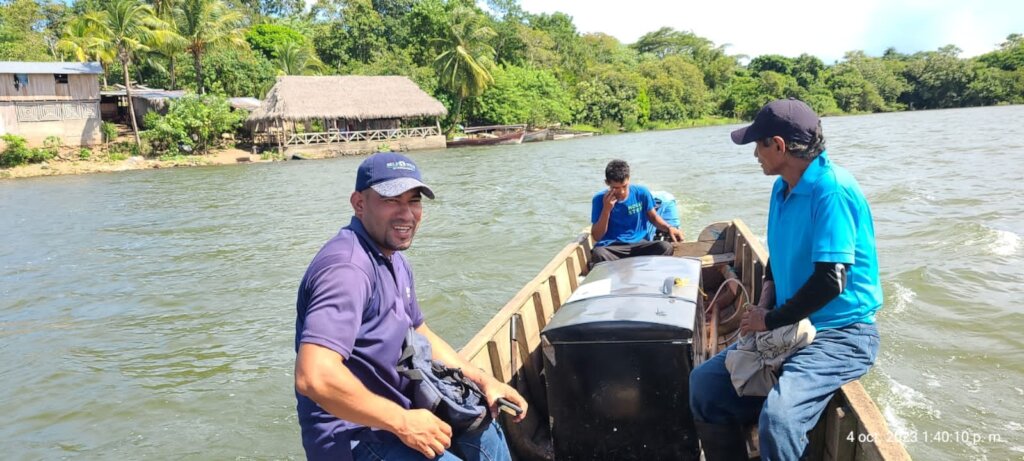
By: Rodolfo Ricardo Hernandez Navas | Agricultural Extension Program Officer
The Solentiname Archipelago is located 25 km west of the city of San Carlos, the capital of the Municipality of Rio San Juan, Nicaragua. Solentiname is made up of 36 small islands of volcanic origin within Lake Cocibolca, including four major islands: Mancarroncito, Mancarrón, San Fernando and La Venada, where there is a small population, some domestic animals and basic infrastructure. The other 32 islands are smaller, serving as a refuge for wild birds and various species of aquatic animals.
Its inhabitants are dedicated to painting, making handicrafts (carved figures of animals from balsa wood) and tourism, although in recent years both tourist visits and the sale of handicrafts have been decreasing. The inhabitants have looked for alternatives such as selling their products to the neighboring country of Costa Rica, to defray personal expenses, and purchase raw materials for making their works of art. On a smaller scale, fishing and agriculture take place, as the villagers live on small islets that consist of small areas suitable for crops. Many carry out some agriculture, mostly for their own consumption, rather than for commercial production.
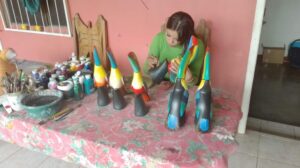
Painting is part of their art
Although the Archipelago is not far from the city of San Carlos, access to it is quite limited. Mostly its inhabitants travel by public transport (boats), which have a specific schedule. This allows people to leave the islands and travel to San Carlos to go to the hospital or banks, or make other arrangements, as they do not have any of these services, much less support for their personal, agricultural, livestock and fishing activities.
Lacking commercial support, the villagers look for options to improve their quality of life, and that is how Self-Help International began to be involved. It all started with a simple conversation that the Agriculture Program Officer of Self-Help International had with a boat captain who travels from San Carlos to Solentiname. The officer shared with the captain the work that the organization does with respect to improving food production and nutrition of the people. The captain was interested and immediately asked for support from the organization. He said that he knew many people from the island of Mancarron who were already working in agriculture. The Mayor’s Office of San Carlos allows the population to use part of the land on the island to plant crops, since they are in a natural reserve área. This would be good for them, since with professional help they could improve their yields and thus not have to travel to San Carlos or even Costa Rica to be able to buy their perishable food. This conversation prompted the Program Officer to suggest to the captain that he gather these people and make a written request to support their initiative to make that kind of change.
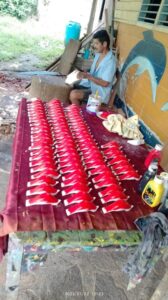
Inhabitants basic job “handcrafting”
Immediately, the leader of a group of 45 interested farmers took the initiative to call Self – Help International and ask to be part of the Agriculture program, because they wanted to learn how to produce more and make better use of the land.
By June Self-Help International had started with education promoting the use of INTA Nutrader seed corn, good management during the first 45 days, use of organic products and promotion of the consumption of healthy and bio-fortified foods. In addition, they donated INTA Nutrader seed corn, biofortified rice of the Nutre Zinc variety and biofortified beans. Self-Help International also involved the farmers of the other inhabited islands so that everyone in the Archipelago would get the same benefits.
Self-Help International provided training to a total of 127 farmers from the Solentiname Archipelago, among them 45 farmers from Isla Mancarron, 42 farmers from Isla San Fernando, 40 farmers from Isla La Venada. They received seeds with high protein content (corn, rice and beans).
Despite the distance that exists between the Islands and the Self-Help office near San Carlos, it was possible to provide support and carry out activities with the farmers of the different islands. They showed interest, organization and commitment to the work. The farmers expressed the following stories:
Farmer José from Isla Mancarrón
“As a representative of the group from Mancarrón Island, I would like to thank God for giving us the opportunity to get to know this organization, with the objective of helping low-income producers to improve their production through the introduction of a new variety of corn (INTA Nutrader) with nutritional properties necessary for our bodies. In addition, the planting technique that we have been taught (double row) and have put into practice, is a very good technique for us who do not own land. We learned to use a small space of land and produce more with the seed provided. This technique will be useful for all the people of the island because the mayor’s office of San Carlos allows us to use some land only for agricultural work, and we can put it to good use and obtain good results. At the beginning the planting was a little difficult for us because it was a new method. Some of us were doubtful because it was a very dense planting and we thought that the corn would not develop well. We followed the recommendations given during the visits,and in the end we were all very happy with the results obtained with this variety of corn and the techniques applied. As an average, the group from Mancarrón Island obtained from the planted plot of 25 yards by 25 yards, 300 pounds of corn, super good results. All those involved in this work commented that it has been a good experience, that the results obtained were better than expected, and we will continue to work in this way to obtain greater returns.”
“We are grateful to Self-Help International and its collaborators for taking us into account and providing us with new varieties of crops with great nutritional value for our consumption. We hope to continue to work with the organization to continue developing skills and helping others.”
Farmer Rodolfo from Isla La Venada.
“Thanks to Self-Help International for having come to Solentiname. We have obtained many benefits in agriculture since they provided us with seed for corn, rice, beans and cassava, selected according to the climate of this area, important for the improvement and renewal of our crops. This has brought with it an improvement in our diet, as well as in our harvested yields, speaking of corn and beans. In the case of rice we obtained just a small production, but it was because of the weather during the season. We obtained 400 pounds from the 5 pounds of seed that we received. All this was thanks to the recommendations that were given to us during the technical follow-up visits that we received. Despite the variable climate in the area, it was possible to harvest the three crops with very good yields, thanks to the double row planting technique used in corn and beans.”
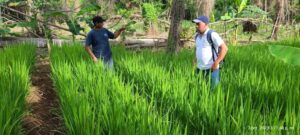
Rodolfo showing his rice plantation
“We thank the organization and we are always willing to continue working and always waiting for the visits and advice that are given to us through talks, follow-up visits and discussion groups through WhatsApp networks.”
“We ask the organization for its support because for several years it has been the one that has extended its hand to work for a common good: to produce more on a small amount of land. We were practically abandoned in the area of agriculture and thanks to the brotherhood we obtained with SHI we managed to make many changes to improve and help other farmers help themselves.”
Rosa from Isla la Venada.
Mrs. Rosa speaks on behalf of the 11 members of her family who are fishermen by profession, who collect the fish and dedicate two days to the sale of the fish in San Carlos on Tuesdays and Fridays. During planting seasons, the family also chooses to plant crops to obtain the basic foods that every Nicaraguan lives on. Upon hearing about the work and support of Self-Help International, she, along with her daughters, sons-in-law and grandchildren, decided to make the change to get better yields in their crops. And since the organization saw they had a great interest and work spirit, they provided this family with all the varieties that they offered so that they could diversify their diet.
Corn:
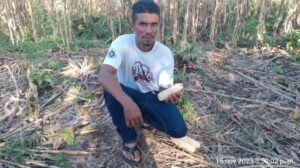
Rosa’s son-in-law in the corn and bean field
Rosa and her family are grateful to the organization for teaching them the way of planting that the organization promotes (double row), to improve the yields of farmers who have little land. Planting with this technique yielded approximately 4,400 pounds in 11 plots, that is, 400 pounds per plot.
“We saw that with the double row planting technique, plus the variety and quality of the seed on a small plot of land, the results are very good. We harvest the corn and we have left it in a container for protection because it is for our own consumption and that of the animals we have. So we are happy because we have enough food to last us for the whole year, and before SHI came that was a dream for us. Now it is a reality.”
Beans:
“As far as the beans are concerned, the seed is of good quality and very resistant to drought and disease. This variety is very high yielding and it grows in soils with little fertility and with very little water. Although the rains stopped early, the beans managed to fill the pods and the yields obtained were very good. With the 150 lb. that they loaned us we planted more than 1.7 acres. To date we have harvested 1,300 pounds and we have not harvested all that we sowed. If the rains had been as in previous years the production would have been even higher . We are satisfied with what we have obtained despite the adversities of the climate toward the crop. It responded very well and exceeded our expectation. Comparing with other farmers in the area who planted beans of native varieties, their yields were very low, some harvesting around 500 pounds per 1.7 acres, others 800 pounds, and others at most 1,000 pounds. With this bean we surpassed the others, since with the seed that was given to us we established over 3 acres and we have harvested more than what the others obtained in their plots.”
Rice:
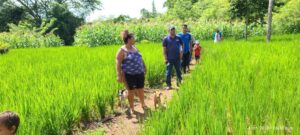
Rosa showing her rice and corn plantation
“We were donated 5 lbs. of rice of the Nutre Zinc variety. It was sown at the wrong time with respect to the rains. It did not yield much, but it is of good quality and cooks well. It is of very good quality for consumption. We kept 100 pounds as seed to sow at the right time, when there is more chance of rain, and we hope to obtain better yields from it. The rest was kept for our own consumption.”
“We always appreciate the support of the organization with the quality of seed, since this is what the farmer depends on to obtain better yields, in addition to the teachings of how to plant to obtain more yields on a little land. We want to continue learning more from you, we always hope for your support, to continue improving and working in a better way, Thanks for your support and your information. I say goodbye by thanking everyone involved in this work, especially the donors who make all this work possible to continue helping to improve agriculture in our country.”

Powered by Wapiti Digital #servetheherd
This is my rich text.
This is more rich text.
I am a list
Lists are cool